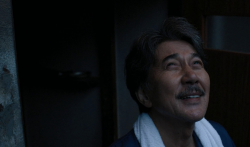Video killed the radio star, curiosity killed the cat and bad luck and a lack of funds killed The Man Who Killed Don Quixote, the latest would-be joint from offbeat director Terry Gilliam. The only thing that remains of the director’s vision for a film version of Cervantes’ Don Quixote is Keith Fulton and Louis Pepe’s documentary Lost in La Mancha—a detailed account of the dissolution of one director’s dream. Fans of Gilliam’s idiosyncratic style will especially enjoy the chance to see him in action, although the documentary stands on its own merit as a self-contained work. Eschewing commentary or editorializing, the film uses a fly-on-the-wall perspective to tell the story, content to watch as circumstances wreak havoc with the filming.
Gilliam has proven his affinity for daunting, highly ambitious projects before through such films as Brazil, 12 Monkeys and Fear and Loathing in Las Vegas. As a director who has always trusted his own vision rather than the focus-group and profit-oriented approach to filmmaking, Gilliam has continuously proven to be a thorn in the side of producers and financiers looking for a simple, marketable film. The controversy surrounding 1985’s darkly comic Brazil proves this—Gilliam’s version runs 142 minutes, the studio re-release runs 95 minutes and excises much of the black humor, including the downer ending. His next film, The Adventures of Baron Munchausen, went famously over-budget and stigmatized Gilliam as a reckless director in the eyes of most Hollywood production companies, a bit of background information which La Mancha narrates with a cut-out animation sequence reminiscent of the ones Gilliam created as a member of Monty Python’s Flying Circus.
With a cast that included performers like famed French actor Jean Rochefort (a perfect fit for the title role), white-trash heartthrob Johnny Depp as a time-traveling executive turned Sancho Panza (some creative liberties were taken with the story) and an imaginative director like Gilliam overseeing the project, it’s a wonder why the whole endeavor turned into such a spectacular failure. The documentary gives an overview of the problems that beset the production-actors arrived late, storms wreaked havoc on the shooting, Rochefort herniated a disc in his back and was unable to ride a horse, investors grew increasingly skittish and cumbersome-the sum of which ultimately resulted in halting the production.
Ironically, Gilliam himself comes across as one of the greatest stumbling blocks to the film’s completion. As the director himself points out, “I’ve made the film so many times in my head I don’t know if I could make it for real now.” La Mancha shows Gilliam as driven and obdurate, committed to making the film he has envisioned without compromise or concessions of any kind. Of course, to be true to this vision requires a considerably greater amount of time and money than Gilliam was granted. While he was able to raise $32 million from European financiers (an enormous amount for a non-Hollywood production), it was only half of what he estimated he needed, a fact he was aware of going into the shoot.
The obvious comparison conveyed by the film is that Terry Gilliam is the directorial equivalent of Don Quixote—both are idealists operating outside the constraints of reality on a personal quest, one driven by chivalry, the other by artistic ambition, with both laboring under delusions of grandeur. Quixote sees giants where only windmills exist, and Gilliam sees a lush and conceptually intricate film where there is only the budget for half of one.
Despite Gilliam’s best efforts, The Man Who Killed Don Quixote exists only as a few storyboards, brief scenes of early production footage and an unrealized dream that still haunts the director. Lost in La Mancha, on the other hand, succeeds as an interesting look inside the head of an overly creative director, unfortunately culled from the events surrounding one of his most spectacular failures.




